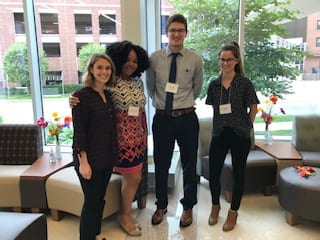Featured Projects
GPHAP students participate in a wide variety of health-related activities across campus. Many of these activities also fulfill the GPHAP co-curricular requirement. Students from Harris may publish articles in the Chicago Policy Review, a student-run program that publishes digestible analyses of complex issues and the policies surrounding them. Crown Family School students may publish in the Crown Family School Social Services Review, a publication that examines social welfare policy and practice. Booth students may participate in the Booth Healthcare Group, and serve as co-chairs. The Student Hotspotting program and Case Competitions are activities that are open to students from all schools.
Racial Justice Learning: A Resource Guide
This is an introductory guide/central resource list about anti-racism, decolonization, and white supremacy (and more). It can be used to share or guide conversations with peers (especially white and non-black POC peers) on the journey towards understanding. A GPHAP student from the Crown Family School, Rosie Rogers, is one of the students who put this resource together.
Link here: https://docs.google.com/document/d/1ZkeCJ9_5xtgf0M_BlMi60aOToSrXcRo-QjATwqvrHEQ/edit
Students from across degree programs work on a variety of projects related to healthcare. Scroll through to see information on:
The following is a collection of briefs written by GPHAP students. GPHAP students from Harris Public Policy may publish articles in the Harris Health Briefs, a student-run program that publishes digestible analyses of complex issues and the policies surrounding them.
Each year the Brown Fellow organize and host an event for the entire GPHAP cohort. Below is a description of previous events:
Student Hotspotting
Six University of Chicago students are currently participating in the Interprofessional Student Hotspotting Learning Collaborative. Through the program, students are connected with UChicago Medicine patients who have complex medical and social needs to establish relationships, create care plans, and help each patient navigate their care plan. Our team will participate in monthly case conferencing and receive ongoing mentoring as part of a national initiative developed by the Camden Coalition based in Camden, NJ. Two GPHAP social work students, and two GPHAP medical students, along with a pharmacy student and a nursing student, will learn skills needed by the next generation of healthcare professionals. This is the 4th year that GPHAP is participating in the Collaborative, and we wish our students luck!

Pictured from left to right, Michaela McGlynn, Michelle Agunloye, Joseph Griffin, Madeline Hoffman. Not pictured: Beverly Kyalwazi and Golda Sinyavskya